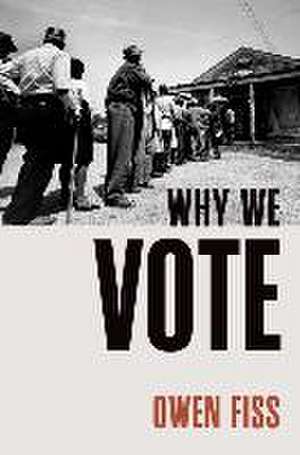Why We Vote: Inalienable Rights
Autor Owen Fissen Limba Engleză Hardback – mai 2024
Din seria Inalienable Rights
-
 Preț: 135.05 lei
Preț: 135.05 lei - 19%
 Preț: 140.42 lei
Preț: 140.42 lei - 19%
 Preț: 185.02 lei
Preț: 185.02 lei - 13%
 Preț: 94.93 lei
Preț: 94.93 lei -
 Preț: 151.33 lei
Preț: 151.33 lei - 17%
 Preț: 109.13 lei
Preț: 109.13 lei - 9%
 Preț: 140.87 lei
Preț: 140.87 lei - 23%
 Preț: 175.29 lei
Preț: 175.29 lei - 11%
 Preț: 122.71 lei
Preț: 122.71 lei - 13%
 Preț: 128.47 lei
Preț: 128.47 lei -
 Preț: 128.65 lei
Preț: 128.65 lei -
 Preț: 220.36 lei
Preț: 220.36 lei -
 Preț: 130.44 lei
Preț: 130.44 lei -
 Preț: 215.08 lei
Preț: 215.08 lei - 7%
 Preț: 150.42 lei
Preț: 150.42 lei - 8%
 Preț: 132.46 lei
Preț: 132.46 lei -
 Preț: 138.14 lei
Preț: 138.14 lei - 19%
 Preț: 175.46 lei
Preț: 175.46 lei - 12%
 Preț: 238.13 lei
Preț: 238.13 lei -
 Preț: 217.26 lei
Preț: 217.26 lei -
 Preț: 260.31 lei
Preț: 260.31 lei -
 Preț: 217.64 lei
Preț: 217.64 lei - 12%
 Preț: 238.13 lei
Preț: 238.13 lei
Preț: 127.24 lei
Preț vechi: 146.49 lei
-13% Nou
Puncte Express: 191
Preț estimativ în valută:
24.35€ • 25.33$ • 20.41£
24.35€ • 25.33$ • 20.41£
Carte disponibilă
Livrare economică 10-15 februarie
Livrare express 06-12 februarie pentru 41.47 lei
Preluare comenzi: 021 569.72.76
Specificații
ISBN-13: 9780197746387
ISBN-10: 0197746381
Pagini: 184
Dimensiuni: 147 x 203 x 33 mm
Greutate: 0.33 kg
Editura: Oxford University Press
Colecția OUP USA
Seria Inalienable Rights
Locul publicării:New York, United States
ISBN-10: 0197746381
Pagini: 184
Dimensiuni: 147 x 203 x 33 mm
Greutate: 0.33 kg
Editura: Oxford University Press
Colecția OUP USA
Seria Inalienable Rights
Locul publicării:New York, United States
Recenzii
Owen Fiss is the acknowledged master of purpose-driven constitutional interpretation. In this crucial book, he focuses on democracy itself, urging the courts to adopt a systemic approach to treating voting as the right at the core of our democratic Constitution. Why We Vote shows that Fiss's unique combination of moral vision and legal virtuosity is as essential, and as powerful, as ever.
Fiss has a genius for concise and clear constitutional arguments, and this book will be of great interest to any reader who fears that traditional American voting rights are currently at great risk.
This is a work of great lucidity and moral power. Fiss gives the best case we are likely to see for reading the Constitution as a charter of democracy. His arguments deserve close attention from jurists, scholars, and activists.
Modern constitutional law has lost its way. It has forgotten that our Constitution, above all, intends to create a democracy, a system where the people truly rule. In this invaluable book, Owen Fiss eloquently reminds us of our Constitution's democratic character. Constitutional law is not-but must be-the law of democracy.
At a moment when an authoritarian movement is existentially challenging democracy as a system of government, comes this fresh reminder that, at bottom, our Constitution is meant to protect democracy. And who better than Owen Fiss to urge us through a compelling review of the relevant history and case law that if we're not centering democracy in our Constitutional jurisprudence, we're doing it wrong. May a whole new generation of judges and scholars pick up this book and carry forward Fiss's wise and necessary charge.
Both the book and the process it describes are a compelling tour de force. Essential.
Fiss has a genius for concise and clear constitutional arguments, and this book will be of great interest to any reader who fears that traditional American voting rights are currently at great risk.
This is a work of great lucidity and moral power. Fiss gives the best case we are likely to see for reading the Constitution as a charter of democracy. His arguments deserve close attention from jurists, scholars, and activists.
Modern constitutional law has lost its way. It has forgotten that our Constitution, above all, intends to create a democracy, a system where the people truly rule. In this invaluable book, Owen Fiss eloquently reminds us of our Constitution's democratic character. Constitutional law is not-but must be-the law of democracy.
At a moment when an authoritarian movement is existentially challenging democracy as a system of government, comes this fresh reminder that, at bottom, our Constitution is meant to protect democracy. And who better than Owen Fiss to urge us through a compelling review of the relevant history and case law that if we're not centering democracy in our Constitutional jurisprudence, we're doing it wrong. May a whole new generation of judges and scholars pick up this book and carry forward Fiss's wise and necessary charge.
Both the book and the process it describes are a compelling tour de force. Essential.
Notă biografică
Owen Fiss is Sterling Professor Emeritus of Law at Yale University. He clerked for Thurgood Marshall when he served on the United States Court of Appeals for the Second Circuit, and later for William J. Brennan, Jr. on the Supreme Court. Fiss also served in the Civil Rights Division of the Department of Justice from 1966 to 1968. He is the author of many books, including The Law As It Could Be, The Irony of Free Speech, and Pillars of Justice. In 2020, the American Philosophical Society awarded Fiss the Henry M. Phillips Prize for his lifetime achievement in jurisprudence.
